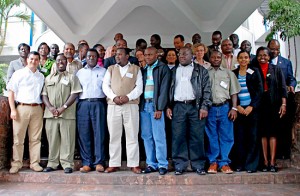 A workshop on media handling and science communication was held for spokespersons of the Water Efficient Maize for Africa (WEMA) project during 4-5 August 2009 at the Nairobi Safari Club. Organized by the International Service for the Acquisition of Agribiotech Applications (ISAAA), this workshop aimed to equip scientists and WEMA principal investigators with skills for effective communication with the media and for designing and packaging comprehensive communication briefs on the project. Among other things, participants were shown the journalistic “inverted pyramid” model for writing, whereby texts should lead off with the most important information and then move on to background or supporting information.
A workshop on media handling and science communication was held for spokespersons of the Water Efficient Maize for Africa (WEMA) project during 4-5 August 2009 at the Nairobi Safari Club. Organized by the International Service for the Acquisition of Agribiotech Applications (ISAAA), this workshop aimed to equip scientists and WEMA principal investigators with skills for effective communication with the media and for designing and packaging comprehensive communication briefs on the project. Among other things, participants were shown the journalistic “inverted pyramid” model for writing, whereby texts should lead off with the most important information and then move on to background or supporting information.
The event brought to light the challenges faced when communicating about topics like risk. Perceptions of risk differ across countries, as succinctly expressed by Professor Calestous Juma of Harvard University: “In the US, products are safe until proven risky. In France, products are risky even when proven safe. In India products are safe even when proven risky. In Africa, products are risky even if they do not exist.” Participants were advised to be believable, convincing, clear, and concise, and to remain positive under questioning.
Communication theories and the principles of communication were introduced, and participants were encourage to follow the APP model (anticipate, prepare, practice) that involves preparing for interviews with the help of communication personnel to anticipate all manner of possible questions, and practicing before the interview. Avoiding jargon was also emphasized. “I gained new insight into media relations, which will help me communicate with better with the media,” said Stephen Mugo, CIMMYT senior scientist, at the end of the training.
A complementary follow-up event that focused on confidentiality in technology development was held 6–7 August. Organized by the African Agricultural Technology Foundation (AATF) with the WEMA management team, the event was attended by project country leaders and communications staff. Among the principles that emerged was an agreement that information should be shared on a “need-to-know” basis, and that project participants should be careful about what information is marked as confidential. Resource persons were Francesca Re Manning, an advocate working with the Central Advisory Service for Intellectual Property (CASIP), Rome, together with Gabriela Wehrle of Monsanto, and Lucas Oluoch, legal officer at the Kenya Agricultural Research Institute (KARI). Attending from CIMMYT were Yoseph Beyene (associate scientist), Anne Wangalachi (communications officer), and Judie- Lynn Rabar (science writer/editor). Stephen Mugo (senior scientist) was among the organizers of the training as the WEMA-Kenya project leader. Logistics were jointly organized by AATF and CIMMYT, with Mildred Khalumba as CIMMYT’s representative.